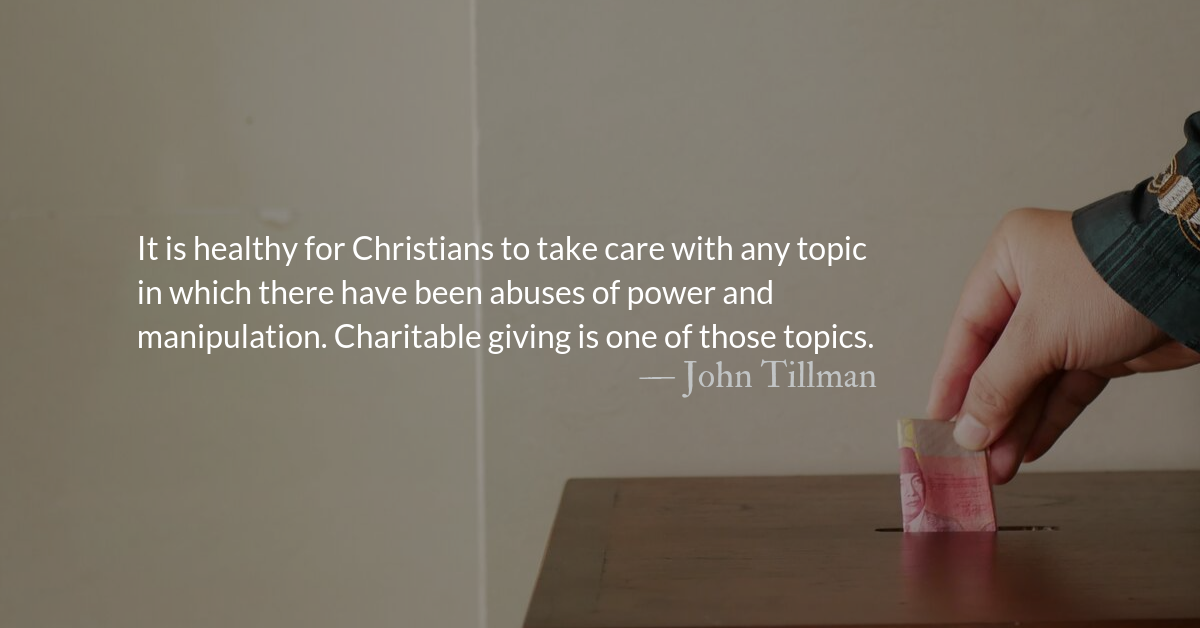Scripture Focus: 2 Corinthians 8.12-15
For if the willingness is there, the gift is acceptable according to what one has, not according to what one does not have.
Our desire is not that others might be relieved while you are hard pressed, but that there might be equality. At the present time your plenty will supply what they need, so that in turn their plenty will supply what you need. The goal is equality, as it is written: “The one who gathered much did not have too much, and the one who gathered little did not have too little.”
Reflection: How to Know When to Give
By John Tillman
Many pastors have confessed that they are nervous whenever they talk about money or giving.* The prosperity gospel has so stained theological discourse with its twisted emphasis on money that pastors fear being lumped in with them when discussing the needs of their ministries.
*As an independent ministry supported by donations, we also feel this tension.
It is healthy for Christians to take care with any topic in which there have been abuses of power and manipulation. Charitable giving is one of those topics.
In 2 Corinthians 8, Paul urged the Corinthians to give not for their own church but for the support of believers in Jerusalem.
How much to give? More than what is “comfortable” but less than would make one “hard-pressed.”
Many modern Christians grouse about tithing as if it is an unreasonable standard. Some maintain that tithing is “Old Testament” and they are not bound by the law. This is true. Tithing is not required. Giving until you can’t give anymore is the New Testament standard.
This is not “sacrificial” giving as some have defined it. Paul expressly advised against giving to the point of being “hard-pressed.” the word Paul uses, “θλίψις or thlipsis,” can mean burdened or troubled. If we are so comfortable giving that we barely notice, we probably aren’t giving enough, but giving should not cause you trouble or suffering. Where is that point? Well, it may be past the point of a simple ten percent, but only the Holy Spirit can help you find it.
To whom to give: Give without question or hesitation to whomever the Spirit directs you to give. Give to your church. To other Christian ministries. To any cause or organization doing good in the world. To anyone who has less than you or helps those who have less than you.
You don’t have to agree with the totality of someone’s work or life to give to them. This doesn’t mean that it is okay to directly support corruption. It does mean that when giving to large causes and organizations, such as your local church and denomination, discovering that there are some bad leaders or bad decisions is not cause to end all giving. Jesus commended the widow’s gift to the Temple even though he condemned the Temple as a “den of robbers” and its leaders as “blind guides.” Be wise and discerning but also be realistic and grounded.
As the Corinthians’ generosity caused Paul to celebrate, may our generosity bring joy and refreshment to those doing good in the world.
As we give past the point of comfort, may we rejoice that we are comforting those less fortunate than us.
Divine Hours Prayer: A Reading
Jesus taught us, saying: “Anyone who is trustworthy in little things is trustworthy in great. if then you are not trustworthy with money, that tainted thing, who will trust you with genuine riches? And if you are not trustworthy with what is not yours, who will give you what is your very own? — Luke 16.9-13
– From The Divine Hours: Prayers for Summertime by Phyllis Tickle.
Today’s Readings
2 Samuel 15 (Listen – 6:06)
2 Corinthians 8 (Listen – 3:25)
Thank You!
Thank you to our donors who support our readers by making it possible to continue The Park Forum devotionals. This year, The Park Forum audiences opened 200,000 free, and ad-free, devotional content. Follow this link to join our donors with a one-time or a monthly gift.
Read more about The Context of The Widow’s Mite
The widow’s story gives us someone to emulate in faith, but also points out someone we should serve with action.
Read more about Generosity that Outlives Tragedy
What happens when time inevitably passes and the images of destruction and devastation no longer dominate our screens? What is the limit of our generosity?







